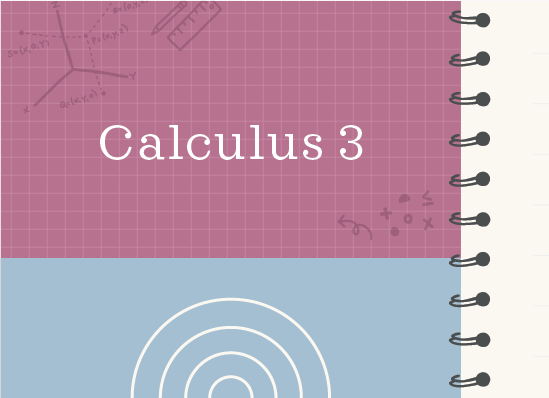How to evaluate iterated triple integrals
What is a triple iterated integral?
Iterated integrals are double or triple integrals whose limits of integration are already specified.
Hi! I'm krista.
I create online courses to help you rock your math class. Read more.
An iterated triple integral might look like
???\int^1_0\int^3_1\int^2_0x^2y^3\ dx\ dy\ dz???
In this case, because the integral ends in ???dx\ dy\ dz??? and we always integrate “inside out”, we’d integrate first with respect to ???x???, then with respect to ???y???, and lastly with respect to ???z???, evaluating over the associated interval after each integration.
You’ll also see triple integrals in which the limits of integration have not yet been specified, like
???\int\int\int_E7xy^2\ dV???
Instead of a triple iterated integral (where the word iterated indicates the presence of the limits of integration), we just call this a triple integral. Since we can’t solve the triple integral without finding limits of integration, we’ll calculate limits of integration for each variable, then add them into the triple integral to turn it into a triple iterated integral.
How to evaluate triple iterated integrals
Take the course
Want to learn more about Calculus 3? I have a step-by-step course for that. :)
Always work from the inside toward the outside
Example
Evaluate the iterated integral.
???\int^1_0\int^3_1\int^2_0x^2y^3\ dx\ dy\ dz???
We always work our way “inside out” in order to evaluate iterated integrals. Since ???dx??? is listed closest to the “inside”, we know we have to integrate with respect to ???x??? first, and that the limits of integration ???[2,0]??? on the innermost integral are associated with ???x???.
Integrating with respect to ???x??? (keeping ???y??? and ???z??? constant), and then evaluating over the interval ???[2,0]??? gives
???\int^1_0\int^3_1\left(\frac13x^3y^3\Big|^{x=2}_{x=0}\right)\ dy\ dz???
???\int^1_0\int^3_1\left[\frac13(2)^3y^3-\frac13(0)^3y^3\right]\ dy\ dz???
???\int^1_0\int^3_1\frac83y^3\ dy\ dz???
Since ???dy??? is listed next, we know we have to integrate with respect to ???y??? (keeping ???z??? constant), and then evaluate over the interval ???[1,3]???.
???\int^1_0\left(\frac23y^4\Big|^{y=3}_{y=1}\right)\ dz???
???\int^1_0\left[\frac23(3)^4-\frac23(1)^4\right]\ dz???
???\int^1_0\left(\frac{162}{3}-\frac23\right)\ dz???
???\int^1_0\frac{160}{3}\ dz???
Since ???dz??? is listed last, we know we have to integrate with respect to ???z???, and then evaluate over the interval ???[0,1]???.
???\frac{160}{3}z\Big|^1_0???
???\frac{160}{3}(1)-\frac{160}{3}(0)???
???\frac{160}{3}???
This is the value of the triple iterated integral.
Now let’s do a triple integral without limits of integration to see how it’s different.
We always work our way “inside out” in order to evaluate iterated integrals.
Example
Evaluate the triple integral if ???E??? is the region below ???z=x+y-1??? but above the region bounded by ???y=x^2???, ???y=0??? and ???x=2???.
???\int\int\int_E7xy^2\ dV???
We know that the region ???E??? lies below ???z=x+y-1??? but above the region bounded by ???y=x^2???, ???y=0??? and ???x=2???.
If we graph the region bounded by ???y=x^2???, ???y=0??? and ???x=2???, we can see that it lies in the ???xy???-plane.
Since we’re looking for the volume directly above the that planar region and not outside it, we can use the planar region to define the limits of integration for ???x??? and ???y???.
Based on the graph, we can see that ???x??? is defined on the interval ???[0,2]???, and that ???y??? is defined on the interval ???\left[0,x^2\right]???.
Since the volume we’re solving for sits on top of the region graphed above in the ???xy???-plane, we know that the lower limit of integration for ???z??? is ???0???. Since the volume lies under ???z=x+y-1???, the upper limit of integration will be ???x+y-1???, which means that ???z??? is defined on the interval ???[0,x+y-1]???.
Generally speaking, we put the most complicated limits of integration on the innermost integral, and the simplest limits of integration on the outermost integral. Since the limits of integration for ???z??? are defined in terms of two variables, we’ll put those on the innermost integral. The limits of integration for ???y??? are defined in terms of one variable, so those will come next. Since the limits of integration for ???x??? are constants, those will come last on the outermost integral.
???\int\int\int_E7xy^2\ dV=\int^2_0\int^{x^2}_0\int^{x+y-1}_07xy^2\ dz\ dy\ dx???
Now we’re dealing with a triple iterated integral, which we already know how to solve. We’ll start by integrating with respect to ???z??? (holding ???x??? and ???y??? constant), and then we’ll evaluate over the interval for ???z???.
???\int^2_0\int^{x^2}_0\left[7xy^2z\big|^{z=x+y-1}_{z=0}\right]\ dy\ dx???
???\int^2_0\int^{x^2}_07xy^2(x+y-1)-7xy^2(0)\ dy\ dx???
???\int^2_0\int^{x^2}_07x^2y^2+7xy^3-7xy^2\ dy\ dx???
Integrating with respect to ???y??? (holding ???x??? constant), and then evaluating over the interval for ???y???, we get
???\int^2_0\left[\frac73x^2y^3+\frac74xy^4-\frac73xy^3\Big|_{y=0}^{y=x^2}\right]\ dx???
???\int^2_0\frac73x^2\left(x^2\right)^3+\frac74x\left(x^2\right)^4-\frac73x\left(x^2\right)^3-\left[\frac73x^2(0)^3+\frac74x(0)^4-\frac73x(0)^3\right]\ dx???
???\int^2_0\frac73x^2\left(x^6\right)+\frac74x\left(x^8\right)-\frac73x\left(x^6\right)\ dx???
???\int^2_0\frac73x^8+\frac74x^9-\frac73x^7\ dx???
Finally, integrating with respect to ???x??? and then evaluating over the interval for ???x???, we get
???\frac{7}{27}x^9+\frac{7}{40}x^{10}-\frac{7}{24}x^8\Big|_0^2???
???\frac{7}{27}(2)^9+\frac{7}{40}(2)^{10}-\frac{7}{24}(2)^8-\left[\frac{7}{27}(0)^9+\frac{7}{40}(0)^{10}-\frac{7}{24}(0)^8\right]???
???\frac{7}{27}(512)+\frac{7}{40}(1,024)-\frac{7}{24}(256)???
???7(256)\left[\frac{1}{27}(2)+\frac{1}{40}(4)-\frac{1}{24}\right]???
???1,792\left(\frac{2}{27}+\frac{1}{10}-\frac{1}{24}\right)???
???1,792\left[\frac{2}{27}\left(\frac{80}{80}\right)+\frac{1}{10}\left(\frac{216}{216}\right)-\frac{1}{24}\left(\frac{90}{90}\right)\right]???
???1,792\left(\frac{160}{2,160}+\frac{216}{2,160}-\frac{90}{2,160}\right)???
???1,792\left(\frac{286}{2,160}\right)???
???1,792\left(\frac{143}{1,080}\right)???
???891\left(\frac{143}{540}\right)???
???\frac{127,413}{540}???
???\frac{4,719}{20}???
This is the value of the triple integral.







